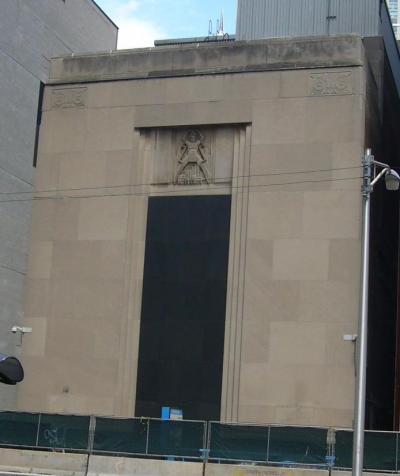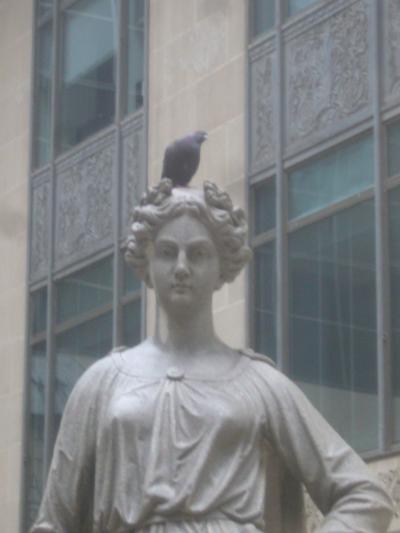Since earliest civilizations, humans have recognized that food is a product of farmland (and, yes, pastureland, fisheries, etc) and have managed to cultivate enough land to feed themselves. Yet today we routinely convert farmland to urban use. American Farmland Trust (AFT) seek to ensure continued agricultural use of some land by buying development rights from farmers, and try to make farms more viable by facilitating community supported agriculture. The geoist fiscal reform provides an alternative way to encourage more conservative and productive use of all land. With additional material from YES! magazine about the slow food revolution, this presentation by HGS instructor Bob Jene suggests that an alliance between AFT and geoists might benefit both.

Originating as a field trip for students completing our Progress & Poverty course, this stroll thru downtown Chicago examines some of the ways that average people, and the community as a whole, are deprived of their just earnings. Among other things we’ll see who benefits from the expensive infrastructure and “economic development” projects, how Thomas Jefferson wanted Chicago to fund its public schools, what happens when a well-located building burns down, and how land speculators get productive workers to pay their taxes. Expect to walk about 2 km, maybe we’ll stop for snacks (individual settlement) along the way.
A $10 donation is requested from those who are not recent or current HGS students or donors, but nobody will be excluded due to lack of funds. You can make your donation by credit card here, or bring cash or a check.

Originating as a field trip for students completing our Progress & Poverty course, this stroll thru downtown Chicago examines some of the ways that average people, and the community as a whole, are deprived of their just earnings. Among other things we’ll see who benefits from the expensive infrastructure and “economic development” projects, how Thomas Jefferson wanted Chicago to fund its public schools, what happens when a well-located building burns down, and how land speculators get their taxes paid by productive workers. Hardcopy sourced notes will be provided. Expect to walk about 2 km; maybe we’ll stop for snacks (individual settlement) along the way.
A $10 donation is requested from those who are not recent or current HGS students or donors, but nobody will be excluded due to lack of funds. If you have a paypal account, you can make your donation by credit card using the link below, or better yet bring cash or a check.

As farmland yields to “higher-value” uses, how (and how well and how inexpensively) will we eat? Bob Jene reviews data from a leading agricultural preservation organization, the American Farmland Trust (AFT). Among other things they buy development rights from landowners to insure continued farming use, and attempt to facilitate community supported agriculture which makes family farms more viable. A Georgist fiscal reform encourages more conservative and productive use of all land and reduces sprawl, thus preventing encroachment on farmland. An alliance with AFT would benefit us both.
Between 1948 and 1973, Americans’ real wages rose almost as fast as their productivity. After 1973, productivity grew 147% but wages rose only 19%. This raises two questions:
(1) If workers getting less, who is getting more?
(2) Is there a way to restore the balance?
To solve the problem of poverty, and the many other problems that follow from it, ordinary workers need higher wages. George Menninger describes how to raise wages without interfering in the free market and without taking anyone’s earnings.
George Menninger is an instructor at the Henry George School of Chicago, and attendees at this free program will have the opportunity to sign up for his Progress & Poverty course.
You can sign up for this free event thru Eventbrite, or RSVP directly by email.
Between 1948 and 1973, Americans’ real wages rose almost as fast as their productivity. After 1973, productivity grew 147% but wages rose only 19%. This raises two questions:
(1) If workers getting less, who is getting more?
(2) Is there a way to restore the balance?
To solve the problem of poverty, and the many other problems that follow from it, ordinary workers need higher wages. George Menninger describes how to raise wages without interfering in the free market and without taking anyone’s earnings.
George Menninger is an instructor at the Henry George School of Chicago, and attendees at this free program will have the opportunity to sign up for his Progress & Poverty course.
No reservation is required, but you can let us know by email that you’re coming.
Between 1948 and 1973, Americans’ real wages rose almost as fast as their productivity. After 1973, productivity grew 147% but wages rose only 19%. This raises two questions:
(1) If workers getting less, who is getting more?
(2) Is there a way to restore the balance?
To solve the problem of poverty, and the many other problems that follow from it, ordinary workers need higher wages. George Menninger describes how to raise wages without interfering in the free market and without taking anyone’s earnings.
George Menninger is an instructor at the Henry George School of Chicago, and attendees at this free program will have the opportunity to sign up for his Progress & Poverty course.
No reservation is required, but you can let us know by email that you’re coming.

Urban sprawl is threatening to destroy much valuable farmland. We will look at data from one of the leading national organizations trying to mitigate this damage, The American Farmland Trust (AFT). Among other things they buy development rights from farmers to insure the land’s continued use in agriculture and attempt to facilitate community supported agriculture which makes family farms more viable. The Georgist fiscal reform reduces sprawl alleviating pressure on farmland.
(image credit: Kristian Bjornard ; Attribution-ShareAlike 2.0 Generic (CC BY-SA 2.0); https://flic.kr/p/8RYWFy)

Join us in celebrating Income Tax Appreciation Day. This page will be updated with specifics of our celebration as we figure out how best to do it.
